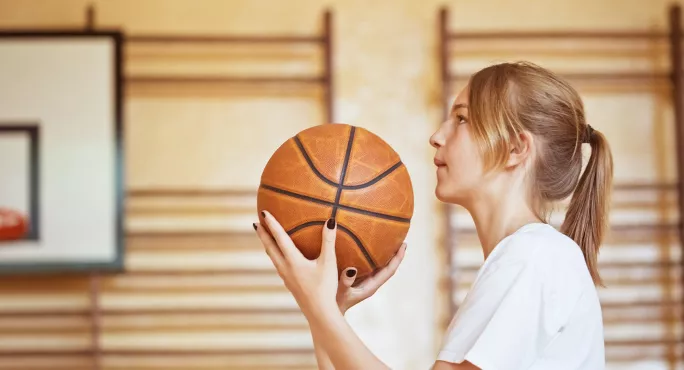PE ‘enjoyment gap’ for girls is widening, new study warns

Girls enjoy PE significantly less than boys, a new study shows, despite nearly two-thirds of female students wanting to be more active in school.
Findings by the Youth Sport Trust reveal that only 64 per cent of girls enjoy taking part in physical Education (PE), compared with 86 per cent of boys. The gap is particularly pronounced at secondary school, where just over half (59 per cent) of girls say they enjoy PE.
It comes after leaders of the main political parties in England have faced calls to ensure that PE is treated with the same importance as “English, maths and science” in an open letter on World Mental Health Day yesterday.
- Mental health: Schools’ crucial role in promoting ‘health for all’
- Physical education: PE policy changes: what schools need to know
- Girls in sport: More girls playing playground football, teachers say
Sports organisations have written to Conservative leader Rishi Sunak, Labour leader Sir Keir Starmer and Liberal Democrats leader Sir Ed Davey to “unlock the potential of sport and physical activity” and play a more meaningful role in “tackling the UK’s growing mental health epidemic”.
Last month, the Department for Education published figures that showed the number of hours of PE and sport taught in state secondary schools had dropped from 326,277 in 2011-12 to 285,957 in 2022-23. This is a drop of 12 per cent since the 2012 London Olympics.
The Youth Sport Trust’s survey findings, published today, show that girls in particular face barriers that stop them from taking part in PE. These include not being confident, having their period, being watched by others and “worrying about how they look”.
Ali Oliver, chief executive of the Youth Sport Trust, said that the survey represents an “urgent call to action” for “all organisations involved in the development and delivery of physical education” for girls.
“We know that despite all the hard work being done, there is so much more still to do,” Oliver added.
The findings show a “widening PE enjoyment gap” between girls and boys, with female students enjoying PE increasingly less in the past six years.
“Not only should this research raise alarm bells about future adult activity levels and the consequences of this, but it is devastating for the physical and mental health of young women today,” Oliver said.
Call to maximise ‘transformative power’ of PE
Sports organisations also emphasised the need for joint work to improve uptake. “Our sector needs more ambition from leaders to work with us, to give our young people the best chance in life by striving to become the most active nation in Europe,” the letter said.
“Government - both now and in the future - must therefore demonstrate boldness and bravery and commit to maximising the transformative power of our sector,” it continued.
The letter is jointly signed by England Athletics, Welsh Athletics, Scottish Athletics, Athletics NI, Youth Sport Trust, Sport and Recreation Alliance, Run 4 Wales, London Marathon Events, The Great Run Company, The Daily Mile and Parkrun.
Launched yesterday at an event in Liverpool organised by the all-party parliamentary group for running, the letter further calls for leaders to put “physical and health literacy at the heart of the future school curriculum” and for all children to have access to “high-quality PE”, “co-curricular activity” and “community provision”.
Research by the Youth Sport Trust coincides with the International Day of the Girl. Its Girls Active survey received responses from nearly 25,000 young people - more than 18,000 girls and more than 6,000 boys - aged between 7 and 18.
It identifies six key principles that underpin effective practice in engaging girls in PE, sport and physical activity. These are:
- Take a long-term approach to engaging girls.
- Put developing self-confidence at the heart of PE.
- Make PE and sport relevant to girls’ lives.
- Recognise the power of friends to drive progress.
- Develop role models for the future.
- Empower girls to design and deliver PE and sport.
You need a Tes subscription to read this article
Subscribe now to read this article and get other subscriber-only content:
- Unlimited access to all Tes magazine content
- Exclusive subscriber-only stories
- Award-winning email newsletters
Already a subscriber? Log in
You need a subscription to read this article
Subscribe now to read this article and get other subscriber-only content, including:
- Unlimited access to all Tes magazine content
- Exclusive subscriber-only stories
- Award-winning email newsletters
topics in this article



